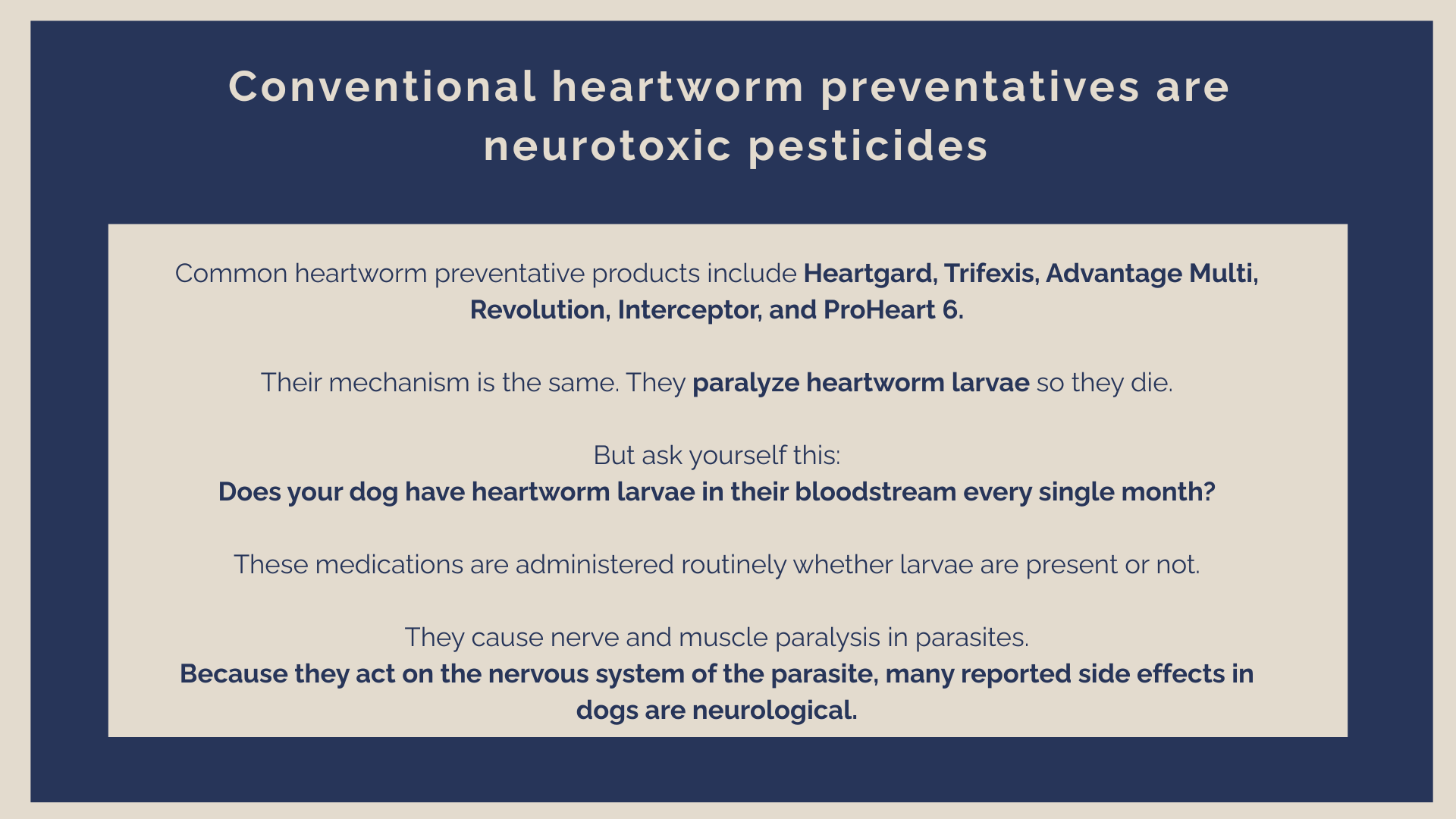Heartworm Disease
A Smarter Way to Protect and Treat Your Dog
By Dr. Lynda Loudon
Heartworm disease is one of the most talked about and feared conditions in dogs, especially in mosquito-prone regions. It is caused by Dirofilaria immitis, a parasitic worm transmitted through mosquito bites. Once inside a dog’s system, the larvae mature into adult worms that reside in the heart and lungs, leading to severe respiratory and cardiovascular issues.
As guardians, we are often told that prevention must be automatic and lifelong, with little room for questions.
But like every major health decision, heartworm prevention deserves thoughtful consideration. Understanding how the disease develops, what true risk looks like, and what options exist for prevention and support allows you to create a protocol that aligns with both safety and long-term resilience. This guide will walk you through heartworm disease, conventional prevention, natural strategies, and how to make an informed, confident decision for your dog.
Heartworm Prevention 101
The Heartworm Life Cycle
It is important to understand the heartworm's life cycle prior to choosing a prevention protocol
Adult heartworms live in an infected dog’s heart and pulmonary arteries. When both male and female worms are present, they reproduce and release microfilariae into the bloodstream.
Mosquitoes ingest these microfilariae when they bite an infected dog. Inside the mosquito, the larvae develop further. When that mosquito bites another dog, it can transmit the larvae.
Over 6–7 months, those larvae can mature into adult heartworms. But this only happens if the internal environment of the dog allows it.
That matters.
Before You Say Yes to Any Preventative
Whenever a preventative is recommended for your dog, pause and ask:
-
Is it truly effective?
-
Is it safe?
-
Are there more natural alternatives?
You deserve to make informed decisions. Not fear-based ones.
.



Let's go back to our Key Questions
1. Are They Effective?
In some areas, heartworm preventatives have shown reduced effectiveness, similar to antibiotic resistance patterns. Here are a couple of studies https://pubmed.ncbi.nlm.nih.gov/38781830/ and https://pmc.ncbi.nlm.nih.gov/articles/PMC11153229/.
Researchers suggest year-round use to slow resistance.
That is not an approach I would choose for my own dogs.
2. Are They Safe?
Safety means asking whether the medication itself can cause illness. Heartworm preventatives are pesticides that work by poisoning larvae in the bloodstream. Common reactions include vomiting and diarrhea, sometimes bloody, which is often the body’s attempt to purge a toxin. Some guardians notice these symptoms occur shortly after monthly dosing, though the connection is not always acknowledged. More serious concerns include autoimmune disease. Dr. Jean Dodds has documented cases linking common heartworm preventatives to autoimmune conditions and death, including seizures, bone marrow failure, and immune mediated hemolytic anemia following administration.
3. Are There Natural Solutions?
A healthy dog with a strong immune system is much less likely to contract heartworm infection. Therefore, foundations of vital health always come first
Building Natural Resilience
Avoid over-vaccination (to reduce immune stress): Following a tailored vaccine schedule or using titers helps protect your dog without unnecessary strain on the immune system.
Whole-food, high-quality diet (avoid processed kibble): Fresh, nutrient-dense foods strengthen your dog’s immune system and overall resilience against disease.
Maintain a healthy gut microbiome: Probiotics and prebiotic-rich foods support digestion, immunity, and long-term wellness from the inside out.
Regular exercise and movement: Consistent daily movement supports circulation, lymphatic flow, detoxification, and balanced immune function.
Clean, Filtered Water: Hydration affects every cell in the body. Providing filtered, contaminant-free water reduces toxic burden and supports kidney function, detox pathways, and metabolic health.
Reduce Environmental Toxin Exposure: Limiting pesticides, lawn chemicals, harsh household cleaners, synthetic fragrances, and unnecessary medications lowers the immune system’s daily workload and preserves resilience.
Stress Reduction and Emotional Stability: Chronic stress elevates cortisol, suppresses immune function, and increases inflammation. A predictable routine, calm leadership, social connection, and adequate rest all support nervous system balance.
Beyond foundational health practices, some guardians choose to incorporate additional immune support tools, such as transfer factors and heartworm nosodes, as part of a broader strategy to strengthen immune resilience.
Transfer Factors
Transfer factors are immune signaling molecules originally identified in colostrum. They help the immune system communicate and respond appropriately.
Research suggests they help modulate and balance immune responses rather than overstimulate them.
Used alongside strong foundations, they may offer additional immune reinforcement.
Dr. William Falconer has a product worth checking out https://venjenz.com/products/venjenz-for-pets-bundle
Heartworm Nosodes
Nosodes are homeopathic preparations made from disease-related material and highly diluted according to homeopathic standards. Used as part of homeoprophylaxis, they aim to gently stimulate immune awareness of a specific organism.
They are typically administered during mosquito season as part of a broader strategy.
Natural prevention is never about one magic product.
It is about building a resilient dog from the inside out.
If you would like to add nosodes to your prevention strategy I recommend finding a homeopathic veterinarian in your area or online. https://theavh.org/find-a-vet/#!directory/map
Mosquito control: Since mosquitoes transmit heartworms, reducing your dog’s exposure is crucial.
Natural Mosquito Repellents
Neem Oil (Topical) 4-Legger Neem Shampoo for bathing.
Dr. Peter Dobias' product: TickHex® Body Spray
Contains Apple Cider Vinegar, Neem Oil, Cedar Oil, Rosemary Oil, Tea Tree Oil, Lemongrass Oil, Peppermint Oil, Rose Geranium Oil
Apple Cider Vinegar (Small Amounts / Diluted Spray) 4-Legger Restore
Cedar Oil Spray Cedarcide Cedarwood All-Purpose Dog & Cat Bug Spray — for pets, home, etc.
Diatomaceous Earth (Outdoor / Bedding / Surroundings)
Safer Brand Food Grade Diatomaceous Earth – 4 lb Animal Feed / Pet Safe — food-grade, safe around pets when used properly.
Lemongrass- Flea|Tick Protect Spray (Lemongrass)
Avoid prolonged outdoor exposure during peak mosquito season and at times of highest mosquito activity, such as dawn and dusk, to reduce the risk of transmission.

What About Dogs in Higher Risk Regions for Heartworm Disease
It is true that there are regions where contracting heartworm disease is a higher risk. Heartworm disease is most prevalent in warm, humid climates where mosquitoes thrive, including:
-
Southeastern U.S. (Florida, Texas, Louisiana, Alabama, Georgia, South Carolina)
-
Midwest river valleys (Mississippi, Missouri, Ohio River Valleys)
-
Coastal regions with high mosquito populations
-
Any area with stagnant water, especially in summer
If you choose to use a conventional preventative because you live in a heartworm-endemic area, milbemycin is my preferred option. I recommend dosing conservatively by rounding down to the lower weight range rather than up, using during peak mosquito season only and administering monthly products every six weeks instead of every four to provide a more cautious approach to protection.
I will give you my own viewpoint here... even if I lived in an endemic area, I personally would not give my dogs conventional pesticides. However, as your dog's guardian, you must make the decision that feels best for you and your dog.
Supporting Detox and Liver Health
If You Choose a Conventional Heartworm Preventative
If you decide that a monthly heartworm preventative is the right choice for your dog, it is wise to also support the organs responsible for processing and eliminating that medication. The liver, in particular, plays a central role in detoxification. Supporting it before and after each dose can help reduce metabolic stress and maintain balance.
Liver Support Options
These are commonly used supportive tools. Always consult your veterinarian for guidance.
Milk Thistle (Silymarin)
Supports liver cell protection and regeneration.
Often started 3–5 days before dosing and continued for several days after.
Tinctures – I recommend a starting dose of 1/4 tsp per 20 lbs of body weight per day, split into 3-4 equal doses.
Powders – give 2-5 mg per 1 lb of body weight, 3-4 times per day.
See my blog on milk thistle for more information https://drloudon.com/pet-health/milk-thistle-how-it-can-benefit-your-dog/
SAMe (S-adenosylmethionine)
Supports glutathione production, one of the liver’s primary antioxidants.
N-Acetyl Cysteine (NAC)
A precursor to glutathione. Supports detox pathways.
Dandelion Root
Traditionally used to support bile flow and gentle detoxification.
Omega-3 Fatty Acids
Help reduce systemic inflammation and support cellular health.
After Dosing. Reduce Inflammatory Burden
For 7 days after administering a preventative:
- Avoid additional chemical exposures such as flea treatments or lawn sprays.
- Avoid new foods or treats that may stress digestion.
- Prioritize rest and calm activity.
- Monitor closely for vomiting, diarrhea, lethargy, tremors, or behavioral changes.
If vomiting occurs shortly after dosing, consult your veterinarian. Try to avoid anti-nausea medications in this instance as the body is purging a toxin. Supportive care should start with fluid therapy and reassess in my opinion.
Recognizing, Testing and Treating Heartworm Disease
Heartworm Infection vs. Heartworm Disease
These two terms are often used interchangeably, but they are not the same.
Heartworm infection means adult heartworms are present in the dog’s heart or pulmonary arteries, but the dog is not showing clinical signs. The dog may feel completely normal. The infection is typically discovered through routine blood testing. At this stage, there may be worms present, but no measurable damage or outward illness.
Heartworm disease, on the other hand, means the infection has progressed to the point that it is affecting the heart and lungs. The dog may develop symptoms such as coughing, reduced stamina, exercise intolerance, weight loss, labored breathing, or even heart failure in advanced cases.
In simple terms:
-
Infection = worms present, no symptoms.
-
Disease = worms present, plus clinical illness and organ involvement.
Understanding this distinction helps remove unnecessary panic. A positive test does not automatically mean your dog is sick. It means you have information and can respond thoughtfully.
Symptoms of Heartworm Disease
Signs of heartworm infection can vary depending on the severity. Some dogs may show no symptoms early on, making routine testing essential. As the disease progresses, symptoms may include:
-
Persistent cough
-
Fatigue after mild exercise
-
Decreased appetite
-
Weight loss
-
Labored breathing
-
Swollen belly (fluid accumulation)
-
Fainting or collapse (in severe cases)
Testing & Diagnosis
No matter which prevention path you choose, routine testing allows you to make informed decisions based on facts, not assumptions.
Dogs should be tested every 6-12 months to detect infections early. The ideal time to test is approximately five to seven months after the end of mosquito season in your area. This timing allows any potential exposure to mature enough to be detected while still identifying infection before heart damage occurs.
Puppies under seven months of age generally do not need testing, as the worms would not yet be mature enough to detect.
Diagnostic Tests for Heartworm
-
Antigen Test: Detects adult female heartworms (but not males or immature worms).
-
Microfilaria Test: Identifies microscopic larvae in the bloodstream.
-
Chest X-rays: Assess heart and lung damage in positive cases.
-
Echocardiogram: Provides detailed imaging of the heart for advanced infections.
If no microfilariae are found, the infection may be in an early stage or consist only of female worms. In such cases, treatment may be less urgent but still requires monitoring.
.
The 4 Stages of Heartworm Disease

-
Class 1: No symptoms or mild signs (occasional cough).
-
Class 2: More noticeable symptoms, including persistent coughing and fatigue.
-
Class 3: Severe symptoms such as frequent coughing, labored breathing, lethargy, and possible heart failure.
-
Class 4 (Caval Syndrome): Worms physically block blood flow to the heart, which is often fatal without immediate surgery.
Treatment Options for Confirmed Heartworm Disease

Conventional Fast-Kill Treatment (Melarsomine/Immiticide)
This is the standard veterinary protocol but is expensive, painful, and comes with risks. I do not recommend this protocol.
Step-by-Step Conventional Treatment
-
Start Monthly Preventive: Eliminates immature worms and prevents new infections.
-
Administer Doxycycline (30 Days): Targets Wolbachia bacteria to reduce inflammation.
-
Melarsomine Injections (Day 60, 90, 91): Kills adult worms but carries significant risks.
-
Steroid Support (Prednisone): Helps manage inflammation.
-
Follow-Up Testing (Day 120 & 150): Checks for remaining microfilariae.
-
Final Test (One Year Later): Confirms elimination of all heartworms.
Risks of Melarsomine Treatment
-
Severe pain at the injection site
-
Blood clots from dying worms
-
Risk of respiratory distress
-
Death rates:
-
5.2% of Class 1 & 2 cases
-
18.2% of Class 3 cases
Because of these risks, many dog owners explore safer alternatives. I do not recommend this method.
Slow-Kill Method (Recommended Alternative)
This gentler, long-term approach involves gradually eliminating worms with lower risk.
Step-by-Step Slow-Kill Treatment
-
Start Monthly Preventive: Prevents new infections and weakens adult worms (milbemycin oxime recommended).
-
Administer Doxycycline 5mg/kg: Targets Wolbachia bacteria. One month of Doxycycline followed by two months off, repeated for a total of four cycles over one year.
-
Test & Restore the Microbiome (After Doxycycline): Use a gut test (AnimalBiome) and supplement with FMT therapy (Legacy Biome).
-
Strict Activity Restriction: Prevents complications from dying worms.

Heart Health Supplements
If your dog is diagnosed with heartworm infection or disease, it is important to support the heart.
Hawthorn (Supports Circulation) Dose: ~1 drop per lb body weight, 3–4x daily (tincture). Product: Five Leaf Botanicals Hawthorne Tincture – Dr. Judy Morgan
CoQ10 (Strengthens Heart Muscles) Dose: 1.0–1.6 mg per lb body weight daily (split AM/PM) Product: VetriScience Coenzyme Q10 10 mg Capsules
Omega-3 Fatty Acids (Reduces Inflammation) Dose: 100 mg combined EPA + DHA per 10 lbs body weight daily. Product: Woof Creek Omega
L-Carnitine & Taurine (Essential for Heart Function).
L-Carnitine Dose: 50–200 mg per kg body weight daily, divided 2–3x
Taurine Dose: 500 mg every 12 hrs (<50 lbs) OR 1000 mg every 12 hrs (>50 lbs). Product: Carnicare DuoMax – Ace Canine (L-Carnitine + Taurine)

Final Thoughts
If you take nothing else from this guide, take this.
You have more power than you think.
Heartworm disease has been framed in a way that often leaves guardians feeling afraid and pressured into immediate, automatic decisions. But when you step back and understand the full picture, something shifts. You begin to see that prevention is not just about killing larvae every month. It is about cultivating resilience.
Instead of focusing solely on chemical prevention, you can focus on building a dog who is simply less susceptible in the first place. That means minimizing what weakens health and strengthening what supports it. Feed a high-quality, species-appropriate diet. Provide regular movement. Offer clean water. Reduce toxic exposure. Support the gut. Create emotional stability. Strengthen the immune system thoughtfully and intentionally.
Will this guarantee your dog will never test positive? No approach offers absolute guarantees. But a truly healthy dog is far less likely to develop clinical disease, and far better equipped to respond if exposure occurs.
This is not about ignoring risk. It is about responding to it intelligently.
You are your dog’s guardian. You know your region. You know your lifestyle. You know your comfort level. My goal is not to tell you what you must do. It is to give you the information, the context, and the confidence to choose wisely.
Prevention at its deepest level is not about fear.
It is about strength.
It is about balance.
It is about building health from the inside out.
And that is a far more powerful place to make decisions from.
Got more questions? We've got answers...
If you’re ready for clear guidance and real support on your dog’s health journey, you’re in the right place.
Join a community where thoughtful, proactive dog moms come together to raise healthy, resilient dogs with confidence and peace of mind.
Learn more about The Dog Mom Society

